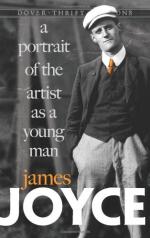|
|
A Portrait of the Artist as a Young Man Topic Tracking: Language
Part 1
Language 1: The language in the opening pages of the novel is disjointed and even babyish. This is Joyce's signal that the narrative style of the book will change to reflect the changes in Stephen's mood and mentality.
Language 2: Stephen's fascination with the word "suck" (pg. 8) shows him trying to come to an understanding of the relationship between a word's sound and its meaning. His curiosity about words, along with the way he is moved by the words of a song (pg. 22) are perhaps an early indication that he will grow up to be a writer.
Language 3: Stephen's appropriation of the religious phrases "Tower of Ivory" and "House of Gold" as phrases to represent the little girl Eileen show how his mind is flexible about language. He is willing to take a phrase out of its common context and apply it to his own experiences.
Language 4: When Stephen is filled with elation after having confronted the rector, the language speeds up and is full of "horroos!" reflecting Stephen's own mood. These closing pages of Part 1 also show the tendency of each part to end with a high, emotionally charged feeling.
Part 2
Language 5: The language in Part 2 becomes increasingly sexually suggestive as Stephen gets more preoccupied with sex.
Language 6: When Stephen sees the word "foetus" carved in the desk at his father's old school, he has a very visceral reaction. He's startled to think that the boy who carved the word might also have been thinking about sex, a preoccupation that Stephen seems to consider his solitary, horrible hang-up. It's interesting that one written word can have more power to move Stephen than all of his father's stories.
Language 7: Stephen's experience with the prostitute is something that's beyond words, although it is linked with language with this description of the prostitute's lips. "They pressed upon his brain as upon his lips as though they were the vehicle of a vague speech...." (pg. 108).
Part 3
Language 8: The shift in language from the lyrical end of Part 2 to the gritty description that opens Part 3 -"Stuff it into you, his belly counseled him" (pg. 109)--illustrates the pattern of a shift from "high" to "low" language that happens between the end of each section and the beginning of the next.
Language 9: The language of the sermons is interesting. It goes on for so long that it's as if Joyce wanted the reader to be subjected to these sermons for as long and to the same degree as Stephen himself.
Part 4
Language 10: The language used to describe Stephen's thoughts begins to soar after he makes his decision not to join the priesthood. It references music and leaping flames:
"It seemed to him that he heard notes of fitful music leaping upwards a tone and downwards a major fourth, upwards a tone and down a major third, like triplebranching flames leaping fitfully, flame after flame, out of a midnight wood." (pg. 179).
Part 5
Language 11: The start of Part 5 has a marked tonal difference than the end of Part 4. As at the start of Part 3, Stephen is surrounded by food, and words like "dripping," "dregs," and "boghole" suggest that Stephen's mind has taken another dip from the lyrical possibilities of language and life to its not-so-pretty everyday realities.
Language 12: As Stephen walks past the city shops, he's disturbed by the waste or misuse of language; these signs have turned words with poetic possibility into "heaps of dead language." (pg. 193).
Language 13: Stephen's conversation with the dean, an Englishman, makes him think about how English is not really his own language. For the Irish, English is both "familiar" and "foreign," always an "acquired speech."
Language 14: The conclusion of the novel with Stephen's diary entries means that the narrative has shifted from the impersonal third-person point of view to the personal first-person and suggests that Stephen is now ready to use his own words to determine and express his own destiny.




